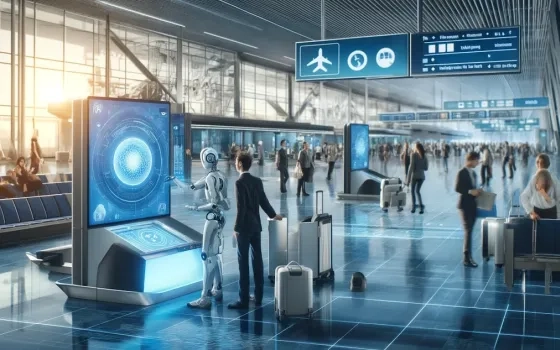The travel industry has always been at the forefront of adopting new technologies to enhance the traveler's experience. From the days of physical travel agents and paper tickets to today’s era of digital bookings and mobile boarding passes, technology has dramatically reshaped how we plan, experience, and remember our travels. In an age where customer satisfaction is paramount, the integration of innovative technologies into travel services is not just a trend; it's a necessity. This necessity drives the industry to continuously innovate, ensuring that each traveler's journey is as seamless and enjoyable as possible. This article explores some of the pivotal technologies that are currently transforming customer experiences in the travel industry, highlighting their applications and benefits.
Integration of Mobile Technology
In the digital age, the smartphone has become a traveler's best companion. Mobile technology is deeply integrated into every phase of the travel experience, from initial planning to the journey itself. The power of mobile technology in the travel industry is evident through the ubiquity of travel apps designed to simplify and enhance all aspects of travel.
Planning and Booking
Mobile apps are now the backbone of travel planning and booking processes. Apps like Airbnb, Booking.com, and Expedia not only offer platforms for booking accommodations and flights but also provide user-friendly interfaces that allow travelers to compare prices, read reviews, and customize their travel plans with a few taps. For instance, the Expedia app uses filters and suggestions to help users find the best deals tailored to their preferences, whether they're looking for budget options or luxury experiences.
On-Trip Assistance
Once the trip begins, mobile apps continue to play a crucial role. Navigation apps like Google Maps are indispensable for travelers navigating unfamiliar cities. These apps offer real-time traffic updates, public transport routes, and estimated travel times, making it easier for travelers to explore new destinations efficiently.
Furthermore, language barrier issues are mitigated by translation apps such as Google Translate, which supports real-time voice and text translations across numerous languages. This functionality is particularly invaluable for travelers in foreign countries where language could otherwise be a significant barrier.
Last-Minute Changes and Mobile Boarding
The ability to make last-minute changes through mobile technology has also significantly improved the travel experience. Airlines’ mobile apps allow passengers to check in, select seats, and even change bookings directly from their smartphones. The introduction of mobile boarding passes, which can be scanned from a device screen, has made the airport experience smoother and faster, reducing the stress associated with physical boarding passes and check-in procedures.
Artificial Intelligence and Personalization
As the travel industry evolves, artificial intelligence (AI) stands out as a transformative force, especially in how it personalizes the customer experience. AI harnesses vast amounts of data to offer insights and automated actions that were previously unimaginable, making each traveler's journey uniquely tailored and more satisfying.
Tailoring Travel Recommendations
AI technologies analyze historical data, browsing patterns, and purchase history to predict and suggest travel options that align with individual preferences. For example, if a traveler frequently books seaside hotels and participates in water sports, AI-powered platforms like TripAdvisor or Kayak can recommend destinations and activities that match these interests. This kind of targeted suggestion not only makes planning more efficient but also enhances the likelihood of a memorable travel experience by aligning offerings with the traveler's known preferences.
Enhancing Customer Support with AI
Customer support is another area where AI significantly impacts. Virtual assistants and chatbots are now common on travel websites and apps, providing 24/7 support to answer queries, resolve issues, and offer assistance in multiple languages. These AI-driven systems can handle a range of tasks from answering FAQs about travel policies to assisting with booking changes or cancellations, effectively reducing wait times and improving customer satisfaction.
For instance, KLM Royal Dutch Airlines employs a chatbot named "BB" (BlueBot) that helps customers book tickets and update them on flight statuses and packing guidelines. This not only streamlines the customer service process but also allows human agents to focus on more complex customer needs, improving overall service efficiency.
Virtual Experiences and Automation
The integration of virtual reality (VR) and augmented reality (AR) in the travel industry, along with automation technologies, is reshaping customer experiences by providing more immersive and efficient services.
Virtual Tours and Experiences
VR technology allows potential travelers to virtually visit destinations before they decide to book their trip. For instance, travel agencies or tourist boards use VR to showcase attractions, accommodations, and experiences in a compelling, immersive format that photos and videos cannot match. This can significantly influence decision-making processes, as travelers get a 'feel' of the destination beforehand. Similarly, AR can enhance physical travel experiences. Apps like Pokémon GO have demonstrated how AR can encourage tourists to explore hidden spots, increasing engagement and creating unique, memorable experiences.
Automated Check-ins and Smart Rooms
Automation extends beyond customer service into actual travel experiences. Many hotels now offer automated check-in processes through apps or kiosks, allowing guests to bypass traditional front-desk interactions, which speeds up the process and reduces crowds in lobby areas. Additionally, smart rooms equipped with IoT technologies allow guests to customize room settings such as lighting, temperature, and entertainment systems through their smartphones or voice-activated devices, enhancing comfort and personalization.
For example, the Hilton Honors app not only allows members to check in and choose their rooms but also uses the smartphone as a digital key. This seamless integration of technology elevates the guest experience by providing unprecedented convenience and control.
Data-Driven Decision Making
In the travel industry, leveraging big data analytics and the Internet of Things (IoT) is crucial for enhancing customer experiences and optimizing operational efficiency. These technologies collect and analyze vast amounts of data, allowing businesses to make informed decisions that cater precisely to consumer needs and improve service delivery.
Big Data Analytics in Travel
Big data analytics helps travel companies understand consumer behavior, preferences, and trends by analyzing data collected from various sources like bookings, social media, mobile app usage, and more. This analysis helps companies anticipate needs and craft personalized offers that appeal to individual travelers. For example, airlines use big data to adjust their pricing strategies dynamically, offering promotions during off-peak times or tailoring special deals to frequent flyers, thereby maximizing revenue and ensuring customer loyalty.
Moreover, data analytics can predict travel disruptions and help companies proactively manage issues before they affect the customer. For instance, predictive analytics can foresee potential flight delays and allow airlines to inform passengers in advance, thus improving the travel experience and reducing frustration.
Internet of Things for Enhanced Travel Experiences
The IoT connects various devices across the travel industry to create a seamless and interconnected experience for travelers. In airports, IoT technology helps manage and track luggage through sensors, reducing the chances of lost baggage and speeding up handling processes. Smart airports utilize IoT to monitor crowd densities, which helps in managing queues and enhancing security procedures without inconveniencing passengers.
Hotels are also embracing IoT to create smart environments that automatically adjust to guest preferences. Room temperature, lighting, and even entertainment options can be controlled via mobile devices or voice commands, providing a personalized room environment that enhances guest comfort and satisfaction.
Challenges and Future Trends
While the adoption of these technologies offers numerous benefits, it also presents challenges that the travel industry must navigate. Privacy concerns are paramount, as the use of personal data and biometrics raises questions about data security and the potential for misuse. Additionally, the high cost of implementing cutting-edge technologies can be a significant barrier for many companies, especially small to medium-sized enterprises.
Despite these challenges, the future of technology in the travel industry looks promising. Emerging technologies like blockchain could further revolutionize travel by making transactions more secure and transparent. Moreover, the continued advancement of AI, machine learning, and IoT is expected to make travel even more personalized and efficient in the coming years.
Wrapping Up
Technology's role in transforming customer experience in the travel industry cannot be overstated. From mobile technology that puts control in the palms of travelers to AI and big data that offer unprecedented personalization, the travel sector is undergoing a significant transformation. As technologies continue to evolve, they promise to make travel experiences not only more enjoyable but also more accessible, secure, and efficient. Embracing these technological advancements is key for travel companies aiming to stay competitive and responsive to the dynamic needs of modern travelers. The journey toward a fully integrated, technologically advanced travel industry is ongoing, and its continued evolution will undoubtedly bring even more exciting changes to how we explore the world.



















